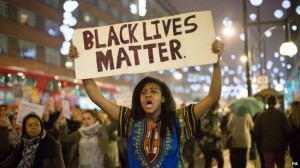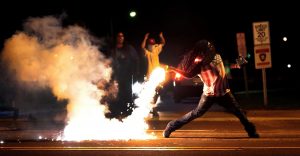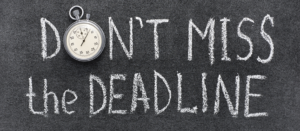Earning Equality: Let America Be America Again
Langston Hughes, a prolific poet of the twentieth-century, once wrote “Let America be America again. Let it be the dream it used to be.” When our forefathers created our great nation, they stated in the United States Declaration of Independence that “all men are created equal.” Now, many American citizens are questioning if that statement still holds truth and if America is truly the great nation it claims to be.

The shooting of Michael Brown, an eighteen-year-old African-American man, by a Caucasian cop, Darren Wilson, led to countless heated debates on race issues in the United States. The decision not to indict Wilson along with a white officer who killed Eric Garner, another African-American man, by holding him in a chokehold, has resulted in numerous rallies across the nation, sparking a movement on social media known as “Black Lives Matter.” The decisions have also caused several violent protests, such as the protests in Ferguson. Heated debates such as these are not only observed in Ferguson, though. They can be witnessed throughout the halls and classrooms of Hills West. Many teachers have decided to discuss the shootings during class, showing the divisions of opinions amongst students. Zachary Valenti, a junior, stated, “I do not think he [Darren Wilson] was fueled by racism. The key to understanding is to be in his shoes. A crazed man is running at you- what do you do? I would probably have done the same thing and there would be no connection to racism in my actions.” In contrast, Angela Pradhan, a Hills West alumna who is currently a freshman at Ithaca College, said, “I believe that both officers were fueled by racism because they are part of a larger society that has been taught to fear individuals like Michael Brown and Eric Gardener. We are taught that certain men, particularly men of color and black men, are threats to our livelihoods and fail to see them as human beings instead of ‘thugs,’ ‘criminals,’ or something to fear. An interesting thing is that white-on-white crime is at the highest amounts, and yet we don’t feel threatened by white individuals. A staggering eighty-three percent of white murder victims were killed by fellow Caucasians, and yet we see that African-Americans are incarcerated at nearly six times the rate of whites. Evaluate our crime and punishment system. I think this is a good time to bring up how in the Aurora shooting massacre, James Holmes, a white individual who was clearly a threat to police officers lives, with his semi-automatic rifle, was not gunned down, but brought away to jail alive. When black individuals commit crimes, we see this as a community issue, when Islamic extremists bomb, we see this as a Muslim issue, when white men go on shooting sprees, we see this as a individual case of a ‘troubled boy.’ I think we as a culture need to reevaluate how we pretend that race is not an issue anymore in how we see crime and punishment.”
There have been national debates on how to end cases police brutality. One solution that has been brought up is the use of body cameras on police officers. “In an ideal world, police officers should be the ones we go to for refuge and safety, but right now people need to be as cautious with officers as [they are with] criminals. Until something in the system is reworked, I would say that body cameras are necessary,” said Valenti. Pradhan disagreed, stating, “The people of Dix Hills have nothing to fear of for police officers. I myself as a light skinned woman have very little chance of getting pulled over or racially profiled because I don’t fit the description of a ‘thug’ or a ‘criminal.’ I think people should be scared of the power that the police force has in our current law system. I think people should be scared of how scared we are to talk about race. I think people should be scared of all the ‘news’ media that doesn’t tell them the facts of the situation at all. I think people should be scared of how apathetic they are to a current movement that’s occurring. Wearing cameras on the job solves nothing as we saw with [the] Eric Garner video evidence of an officer committing a crime. We need to reevaluate how our current police system doesn’t have a system of checks and balances to keep the police force in check.”

Just before Christmas, two white NYPD police officers, Officer Ramos and his partner, were ambushed and fatally shot by Ismaaiyl Brinsley, 28, in retaliation of the Michael Brown and Eric Garner shootings. During the funeral, thousands of cops turned their backs on New York’s Mayor de Blasio as he gave his eulogy and condolences. Many accuse de Blasio of creating a hateful and distrusting atmosphere towards cops that led to the officers deaths. During a press conference following the grand jury’s indictment decision in the Eric Garner case, de Blasio stated:
“This is profoundly personal for me. I was at the White House the other day, and the president of the United States turned to me, and he met Dante a few months ago, and he said that Dante reminded him of what he looked like as a teenager. And he said, I know you see this crisis through a very personal lens. I said to him I did. Because Chirlane and I have had to talk to Dante for years, about the dangers he may face. A good young man, a law-abiding young man, who would never think to do anything wrong, and yet, because of a history that still hangs over us, the dangers he may face—we’ve had to literally train him, as families have all over this city for decades, in how to take special care in any encounter he has with the police officers who are there to protect him.”
In response to the controversy over the statement, Valenti said, “…he was just stating the truth. It is the same as telling your daughter to be wary of strange men; it is the sad truth.” In a statement about the officers’ deaths, President Barack Obama stated, “I ask people to reject violence and words that harm, and turn to words that heal — prayer, patient dialogue, and sympathy for the friends and family of the fallen.” “If an entire police force can turn their back on a mayor, an individual they are supposed to follow, that is another waving red flag,” said Pradhan, “There are plenty of army officials who don’t agree with Obama or even like the President, but they wouldn’t dream of turning their back on the President because it wouldn’t show the power of the force, it would show lack of discipline and respect to authority figures above them. I cannot believe individuals see protesters disrupting traffic as ‘disrespectful,’ but seeing officers publicly turning their backs against the mayor during a funeral to honor two officers as justified action.” Feelings of distrust towards cops have led to many rallies and protests, such as the one on December 13th, where protesters chanted for “dead cops.”
Angela Pradhan, who is an Ithaca College Martin Luther King Scholar, a highly competitive scholarship for social justice and civil rights, attended several protests involving race issues. “The protests I attended were #StopTheParade, #BlackoutBlackFriday, and two other protests on campus including #HandsUpWalkOut,” she said, “Our goals were to attract common people’s attention and to get them to listen to our message. The very reason the protests are ‘disruptive’ and ‘interfere with daily life’ is so you become uncomfortable with going about your daily life ignoring the fact that black individuals are being systematically killed every twenty-eight hours. However, although we wanted to attract attention, we never ever resorted to violence. The atmosphere was extremely peaceful. Although we were chanting and marching, we did not vandalize or break anything. Chants were a way for individuals to verbalize, anguish, and grieve over the lives lost to police brutality. The protests were successful in garnering media attention and in unifying individuals. During the first protest, #StopTheParade, I actually did witness police brutality and it stunned my mind how over sixty police officers could attack a group of less than thirty unarmed teenagers with cardboard signs who were in roads open to the public. What stunned me the most were the individuals they targeted to attack and arrest, and the batons that seemed to pop out of nowhere. I then realized there was a massive overbalance in power, and I needed to continue to protest.”
These debates stirring on social media and in my own classrooms has provoked me to propose the question: Is there truly equality in America? Although rights for African-Americans have come a very long way, are they truly equal to their white counterparts? This question is not only relevant for African-Americans, but for all minorities. Women. Latinos. Homosexuals. People of all difference races, sexualities, religions, and genders. “Something to bring up is ‘The New Jim Crow,'” replied Pradhan, “We all know after slavery was made illegal, these sneaky laws called Jim Crow Laws quietly barred blacks from voting. Now we have ‘The New Jim Crow.’ ‘More African Americans are under the control of the criminal justice system today – in prison or jail, on probation or parole – than were enslaved in 1850. Discrimination in housing, education, employment, and voting rights, which many Americans thought was wiped out by the civil rights laws of the 1960s, is now perfectly legal against anyone labeled a ‘felon.’ And since many more people of color than whites are made felons by the entire system of mass incarceration, racial discrimination remains as powerful as it was under slavery or under the post-slavery era of Jim Crow segregation,’ as Michelle Alexander author of The New Jim Crow states. I think that answers the question of race. A half-black president doesn’t change discrimination in housing, education, and employment. Women still make $0.77 to every male dollar, and discrimination is also rampant in other ways so genders aren’t equal. There’s rampant discrimination against the LGBTQIA+ community, among the legal rights to marry in all fifty states.”
America, dubbed “the land of the free and the home of the brave,” seems far from achieving that prestigious title. As Langston Hughes once said and many people across the nation today can agree with, “…I still can’t see why Democracy means everybody but me.”
To learn more about the “Black Lives Matter” movement, visit http://blacklivesmatter.com.








